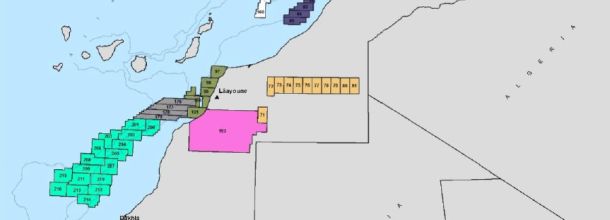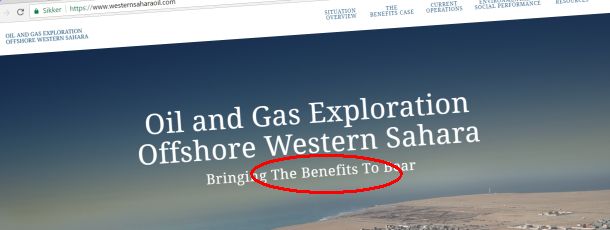Story published by Oilbarrel.com, 14 December 2005.
Oilbarrel (London)
14. December 2005
By Helen Campbell
Thirty years since Morocco was effectively handed control of Western Sahara by Spain, the conflict, said to be oil-driven, between Rabat and Western Sahara's exiled government shows no sign of easing. In a follow up article, Helen Campbell finds the stakes are higher still.
____________________________________________________________
Tensions surrounding the natural resource potential of Western Sahara are flaring. The Polisario, the government of the Saharawi Arab Democratic Republic (SADR), says it has reliable information that US company Kerr-McGee (KMG), is now making plans to drill offshore the disputed territory.
The Polisario has publicly said it cannot guarantee the safety of anyone working for or on behalf of the Oklahoma-based company. KMG has a reconnaissance permit awarded by Moroccan oil ministry Onhym, but the US company's presence in a non-self governing territory has attracted fierce
international criticism and campaign.
Raising the stakes higher still, the Polisario has itself begun negotiations with a number of companies who it says have shown an active interest in offshore blocks it offered in a licensing round launched in London six months ago, to the irritation of Rabat and, no doubt, KMG.
Although those negotiations can only lead to drilling permits upon a peace agreement being brokered between the two sides - and there has been little evidence this year that this is any nearer - it is clearer than ever that both sides mean (oil) business. The Polisario is also attracting interest
to Western Sahara's onshore potential, in the shape of a newly-registered company connected to Wessex Exploration.
KMG and partners Pioneer Natural Resources and Kosmos Energy, which yet again renewed a permit to analyse the offshore Boujdor block for a further six months at the end of October, are alone in their controversial siding with Morocco over Western Sahara, at least in terms of known formal
agreements. The influential Norwegian Petroleum Fund dropped $52 million worth of KMG shares when the Fund said KMG's actions were unethical and could undermine UN peace efforts. In late November two Swedish funds announced they would divest KMG shares early next year, and campaigners are now putting pressure on the Norwegian Petroleum Fund to dump Pioneer.
KMG remains typically tight-lipped over its plans. "Until we complete the analysis of the data we cannot speculate on future activities," says a spokesman, adding the company was unable to say when the studies would be complete. The Polisario says it has evidence that the US company is making plans to drill. Under current legislation, such action would be illegal and not tolerated.
"On the drilling issue, we have received information from reliable sources who told us that KMG, Kosmos and Pioneer are indeed planning to drill," says Kamal Fadel, the Polisario's representative in Australia. "Furthermore, the fact that they keep renewing their permits and spending money is not for fun but for some purpose. The logical and natural course is that companies will have to drill but when, we don't know."
Sending a clear message to the US company, the Polisario said in a recent statement that it "[could not] guarantee the safety of any individual involved in the intended operations of Kerr-McGee. Existing cease-fire arrangements do not envisage such operations in a war zone, and consequently the Saharawi army must carefully consider its position and response if these inflammatory activities proceed."
For its part, KMG continues to stress only that its current activities do not contravene international law as they amount only to data evaluation. And asked how many staff are in either Morocco or Western Sahara, the company replies only that the reconnaissance permit is handled by its
office in Houston. The company's subsidiary Kerr McGee du Maroc is however believed to have an office in Rabat.
The United Nations mediated a ceasefire in the area in 1991 but plans to hold a referendum on Western Sahara's independence have never been realised due to squabbles over who is eligible to vote. Various efforts have been made, perhaps increasingly half-heartedly, to renew peace talks
between Rabat and the Polisario but the current envoy, Dutchman Peter van Walsum, who reports to the UN Secretary General, is not felt to carry much clout nor hope for peace.
Minurso, the UN's peace mission to the region, was renewed for a further six months at the end of October. Minurso sources said the mission did not know what KMG's plans were and declined to comment on the company's activities. Nevertheless, the mission continues to refer to a 2002
document that concludes that drilling would be in violation of international law on non-self-governing territories.
Sources said it was surprising that the UN appeared to be distancing itself from the drilling and other oil matters, given that it is widely felt internationally that KMG's continued presence in the region increases Rabat's bargaining chips and hampers the UN's own peace efforts. Refusing to stand back and let Rabat award drilling rights unchallenged, the Polisario offered the whole of the offshore territory, divided into twelve blocks, at its licensing round last May. Says its Australian representative Fadel:
"We have received several applications from multiple companies and are going to start the process of negotiations with them soon. We expect to announce the award of blocks by the end of this year or by the latest in January of next year."
Fadel declined to name the companies in question. Sources at Woodside, Sasol and Montrose Industries, among those present at the round’s launch in May, said they were not pursuing an interest in Western Sahara. Premier Oil and Perth-based Ophir Energy, also in attendance, are however strongly believed to have bid.
Although the subject of the Polisario's round is the offshore, the potential of Western Sahara's onshore territory has also attracted interest. Wessex Exploration, which previously had a dialogue, albeit short-lived, with authorities in Rabat, recently registered Maghreb Exploration in London and has assigned the data it holds on the vast Aaiun basin to the new company.
"The Aaiun is a big basin and needs a lot of exploration," says managing director Fred Dekker. "The drilling that was done, mostly in the 1960s and 1970s, was very sparse. There is no information on the type of source rock but there must be samples around and that is something I am pursuing."
Meanwhile, Onhym has enlisted the US Trade and Development Agency (USTDA) to accept bids on its behalf for the supply of a Geographic Information System (GIS) to help it map geological structures in "Morocco".
The deal apparently does not include Western Sahara as "USTDA does not provide support to any projects that will take place in or affect [the territory known as Western Sahara]" the agency told oilbarrel.com. Senior representatives added that the maps used for the project stop at the internationally-recognised borders of Morocco, this being something the Moroccans agreed to when the project was first negotiated four years ago. The GIS maps nevertheless disagree with the map used on Onhym's website, in which Onhym details Moroccan oil joint ventures including that of KMG
and which shows Western Sahara as part of Morocco.
The USTDA says there is nothing contained in the contract that prevents the application of the technology provided under the contract to territory in Western Sahara, declining to speculate on how it may be used by Onhym in the future.
"We have no reason to think the technology will be used for anything other than that for which it was originally designed," senior USTDA representatives told oilbarrel.com.
As the impasse continues, results from the dozen wells scheduled to be drilled off Morocco-proper over the next three years will be closely watched. Coupled with the significant discoveries made in recent years in the waters off Mauritania to the south, any discoveries off Morocco will serve only to heighten the determination of the various parties to tap Western Sahara. A feeding frenzy could well become a bloodbath.
----
Source:
http://www.oilbarrel.com/feature/article.html?body=1&key=oilbarrel_features_en:1134524754&feed=oilbarrel_en
----
Statement by the SADR Government
"Intended Activities by Companies in Western Sahara Against the Express Wish of the Indigenous Saharawi Population". Statement of 12 oct 2005.
The oil map is changing in occupied Western Sahara
Kosmos and Cairn have renewed their licence - but did San Leon Energy abandon one of its licences? A new map from ONHYM suggests changes to the highly controversial oil exploration in the occupied territory.
Oil Companies Very Keen On Western Sahara
Oil Companies Very Keen On Western Sahara Despite The Geopolitical Problems. Oilbarrel.com, 14 May 2005.
Kosmos Energy maintains propaganda site after Western Sahara exit
Kosmos Energy has decided to keep their website defending Western Sahara oil search - even after they have left the territory.

